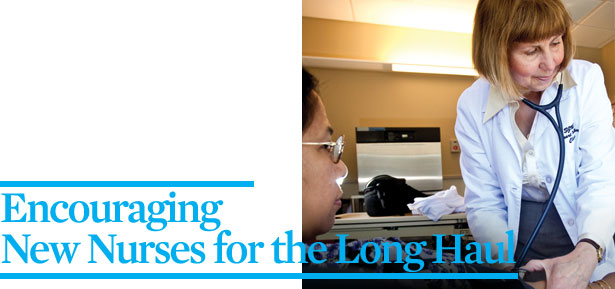
A busy nurse practitioner in Tacoma, Patti Aramburu believes it's important for nurses to take breaks from work for actuvities such as exercising, reading a book, going to a movie, or spending time with friends and family.
Photo by Mike Siegel
One in eight new nurses leave their jobs after one year of work, according to a 2007 study in the American Journal of Nursing.
Factors such as an exhausting schedule, pressure to work overtime, and the emotional demands of a caring career contribute to this high turnover rate, according to Patti Aramburu '97, a nurse practitioner in the outpatient heart failure clinic at St. Joseph's Hospital in Tacoma, Washington.
"Your first year in nursing, the money looks really good, but the schedule will drain your enthusiasm," she says.
"Just get through the first year," Patti Aramburu tells nursing graduates. "You will hear things like, 'Please, can you work an extra shift?' Learn when to say, 'No, I need to take care of myself.'"
When she was a brand-new nurse, Aramburu found herself facing many of these same challenges. When things got tough, she'd call up her aunt, who taught nursing for 55 years. Her aunt gave her good advice on how to set emotional boundaries and encouraged Aramburu to stick with the nursing profession. She's glad she did. "I was so naïve. I thought everybody had somebody like that," she says.
Though she too faces a busy work schedule, she believes taking the time to mentor new nurses is a worthwhile investment in her profession. So she partnered with Lucille Kelley, dean of the SPU School of Health Sciences, to organize the annual Building Bridges dinner: At the end of each school year, School of Health Sciences alumni share a meal — and career advice — with new graduates of the nursing program.
"Just get through the first year," Aramburu tells the graduates, encouraging them to avoid burnout by resisting temptation to work overtime and by taking time for leisure activities. "You will hear things like, 'Please, can you work an extra shift?' Learn when to say, 'No, I need to take care of myself.'"
If Aramburu and other alums can help new nurses navigate their tough first years on the job, they can do their part to help stave off an expected nursing shortage.
There is a projected need of up to a million nurses in the U.S. as baby boomer nurses begin to retire. Though the economic downturn has made the nursing job market tighter, it hasn't eliminated the shortage, because strapped hospitals often can't afford to hire the nurses they need.
Aramburu feels the shortage already, she says, when she needs to admit one of her patients to the hospital, and hears, "We have beds, but we don't have any nurses until the next shift." Staff nurses end up overworked, and it becomes even more important that new nurses seek long-term career guidance and be open to the variety of available nursing jobs.
"One thing that's wonderful about a nursing career is that there are a hundred and one doors you can open," Kelley says.
The next Building Bridges dinner for School of Health Sciences students and alumni will be April 3, 2011.
